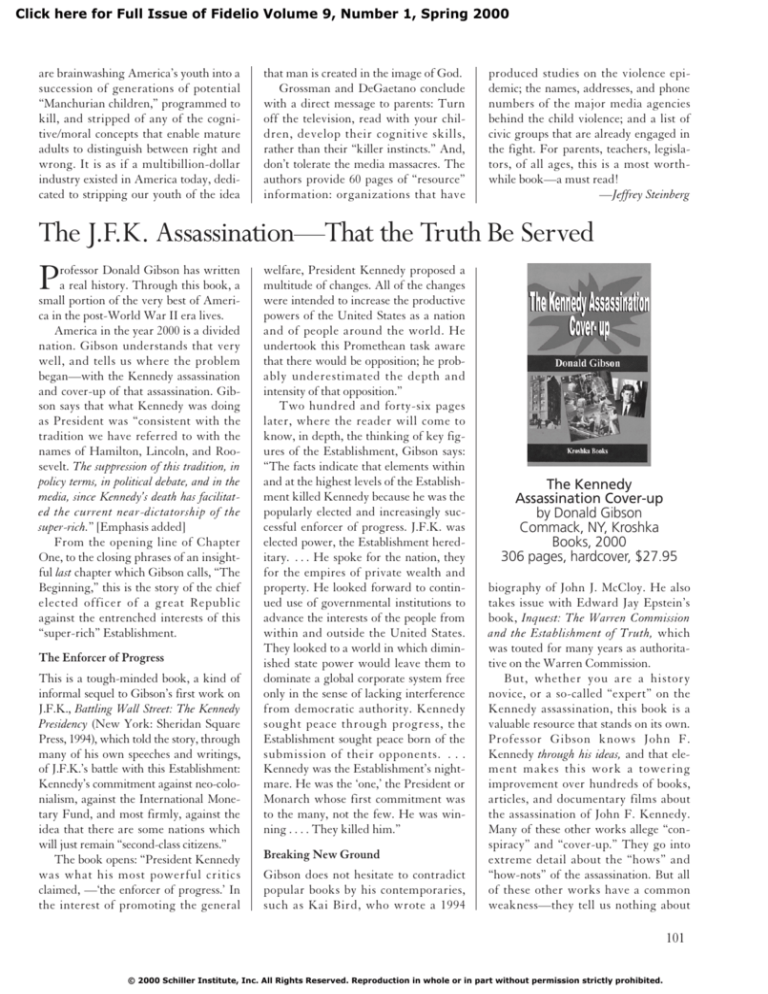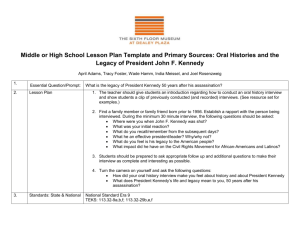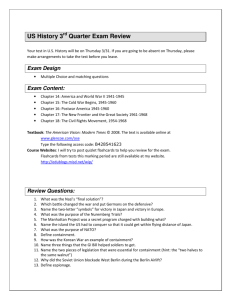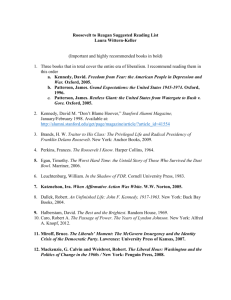
Click here for Full Issue of Fidelio Volume 9, Number 1, Spring 2000
are brainwashing America’s youth into a
succession of generations of potential
“Manchurian children,” programmed to
kill, and stripped of any of the cognitive/moral concepts that enable mature
adults to distinguish between right and
wrong. It is as if a multibillion-dollar
industry existed in America today, dedicated to stripping our youth of the idea
that man is created in the image of God.
Grossman and DeGaetano conclude
with a direct message to parents: Turn
off the television, read with your children, develop their cognitive skills,
rather than their “killer instincts.” And,
don’t tolerate the media massacres. The
authors provide 60 pages of “resource”
information: organizations that have
produced studies on the violence epidemic; the names, addresses, and phone
numbers of the major media agencies
behind the child violence; and a list of
civic groups that are already engaged in
the fight. For parents, teachers, legislators, of all ages, this is a most worthwhile book—a must read!
—Jeffrey Steinberg
The J.F.K. Assassination—That the Truth Be Served
P
rofessor Donald Gibson has written
a real history. Through this book, a
small portion of the very best of America in the post-World War II era lives.
America in the year 2000 is a divided
nation. Gibson understands that very
well, and tells us where the problem
began—with the Kennedy assassination
and cover-up of that assassination. Gibson says that what Kennedy was doing
as President was “consistent with the
tradition we have referred to with the
names of Hamilton, Lincoln, and Roosevelt. The suppression of this tradition, in
policy terms, in political debate, and in the
media, since Kennedy’s death has facilitated the current near-dictatorship of the
super-rich.” [Emphasis added]
From the opening line of Chapter
One, to the closing phrases of an insightful last chapter which Gibson calls, “The
Beginning,” this is the story of the chief
elected officer of a great Republic
against the entrenched interests of this
“super-rich” Establishment.
The Enforcer of Progress
This is a tough-minded book, a kind of
informal sequel to Gibson’s first work on
J.F.K., Battling Wall Street: The Kennedy
Presidency (New York: Sheridan Square
Press, 1994), which told the story, through
many of his own speeches and writings,
of J.F.K.’s battle with this Establishment:
Kennedy’s commitment against neo-colonialism, against the International Monetary Fund, and most firmly, against the
idea that there are some nations which
will just remain “second-class citizens.”
The book opens: “President Kennedy
was what his most powerful critics
claimed, —‘the enforcer of progress.’ In
the interest of promoting the general
welfare, President Kennedy proposed a
multitude of changes. All of the changes
were intended to increase the productive
powers of the United States as a nation
and of people around the world. He
undertook this Promethean task aware
that there would be opposition; he probably underestimated the depth and
intensity of that opposition.”
Two hundred and forty-six pages
later, where the reader will come to
know, in depth, the thinking of key figures of the Establishment, Gibson says:
“The facts indicate that elements within
and at the highest levels of the Establishment killed Kennedy because he was the
popularly elected and increasingly successful enforcer of progress. J.F.K. was
elected power, the Establishment hereditary. . . . He spoke for the nation, they
for the empires of private wealth and
property. He looked forward to continued use of governmental institutions to
advance the interests of the people from
within and outside the United States.
They looked to a world in which diminished state power would leave them to
dominate a global corporate system free
only in the sense of lacking interference
from democratic authority. Kennedy
sought peace through progress, the
Establishment sought peace born of the
submission of their opponents. . . .
Kennedy was the Establishment’s nightmare. He was the ‘one,’ the President or
Monarch whose first commitment was
to the many, not the few. He was winning . . . . They killed him.”
Breaking New Ground
Gibson does not hesitate to contradict
popular books by his contemporaries,
such as Kai Bird, who wrote a 1994
The Kennedy
Assassination Cover-up
by Donald Gibson
Commack, NY, Kroshka
Books, 2000
306 pages, hardcover, $27.95
biography of John J. McCloy. He also
takes issue with Edward Jay Epstein’s
book, Inquest: The Warren Commission
and the Establishment of Truth, which
was touted for many years as authoritative on the Warren Commission.
But, whether you are a history
novice, or a so-called “expert” on the
Kennedy assassination, this book is a
valuable resource that stands on its own.
Professor Gibson knows John F.
Kennedy through his ideas, and that element makes this work a towering
improvement over hundreds of books,
articles, and documentary films about
the assassination of John F. Kennedy.
Many of these other works allege “conspiracy” and “cover-up.” They go into
extreme detail about the “hows” and
“how-nots” of the assassination. But all
of these other works have a common
weakness—they tell us nothing about
101
© 2000 Schiller Institute, Inc. All Rights Reserved. Reproduction in whole or in part without permission strictly prohibited.
John F. Kennedy and his policies.
Gibson corrects that error, and
knowing what he knows about
Kennedy, he is able to take apart the
falsehoods spread about the assassination, from the hours immediately following the shootings on November 22,
1963, to the present. This is where Gibson is breaking some totally new ground
in the history of the Warren Commision, which he appropriately refers to as
the McCloy-Dulles Commmission, after
the Establishment’s two top guns, John
J. McCloy and Allen Dulles, who ran
the Commission.
Both were bitter enemies of John F.
Kennedy. McCloy hated Kennedy’s economic policies, and Allen Dulles hated
both Kennedy’s policies, and Kennedy
personally, after he had been fired from
his position as Director of the Central
Intelligence Agency. Kennedy dumped
Dulles after the Bay of Pigs caper, where
Dulles and his Establishment friends had
orchestrated an invasion of Cuba by a
ragtag team of Cuban exiles—the 1960’s
version of George Bush and Ollie North’s
Nicaraguan “Contra” drug runners.
The Anglo-American Establishment
Gibson is able to document, with the
records of the 1979 House Select Committee on Assassinations, and documents and transcripts from the Lyndon
Baines Johnson Library, that the investi-
gation of the “Presidential Commission
on the Assassination of President
Kennedy” was over before it ever began.
The only purpose of the Commission—
in the words of President Johnnson, in
the words of FBI Director J. Edgar
Hoover, was to stop other investigations—especially inquiries that were
planned by Congress. Establishment
boss John J. McCloy put it bluntly, the
Commission was to “lay the dust”—end
forever—the discussion of the evidence
that Lee Harvey Oswald was part of a
conspiracy.
Gibson uses McCloy as a central
illustration of the “Anglo-American
Establishment’s” hatred of President
Kennedy’s policies. He points out that
McCloy hated the same policies in
Kennedy’s predecessor, Franklin D.
Roosevelt, and that McCloy had written
a memo demanding that all his economic programs be shut down. Gibson hits
on a crucial point in the discussion of
McCloy; a point similarly discussed in a
Strategic Study published in the October
23, 1998 issue of Executive Intelligence
Review magazine by Lyndon H.
LaRouche, Jr., and Stuart Rosenblatt. In
an article titled “How Our World Was
Nearly Destroyed,” LaRouche says, “In
a sense, McCloy was morally insane . . .,”
involved in “a wildly utopian, oneworldist project, aimed at eliminating
the sovereignty of all nation-states,
Starvation in Ethiopia—
Why Was Nothing Done To Prevent It?
Continued from page 3
the cynical character of the policy of
globalization and in the recipes of the
I.M.F. and the World Bank. These
have robbed Africa of the opportunity for development over the last
twenty-five years.
The West also has to face the fact
that the it has lost its moral credibility
in Africa. The main concern is no
longer development and peace, but
only control and exploitation of raw
materials.
102
We demand that there be a
radical change away from the
disaster of I.M.F. policy for Africa.
The Africa debt of $350 billion must
be annulled completely. That will
only happen in the context of a
reorganization of the world monetary
system, without the I.M.F. and
World Bank. We need government
agreements on a New Bretton Woods,
a new worldwide monetary system, as
the foundation for a new, just world
economic order. We need a re-
6.
including that of the U.S.A.” Part of
McCloy’s evil project was the elimination of Kennedy and his ideas.
Humanity’s Ideas
There’s an endearing optimism in Gibson’s book, demonstrated in his naming
the last chapter, “The Beginning.” Summarizing Kennedy’s lifelong opposition
to colonialism, Gibson turns to Pope
Paul VI, who became Pontiff “the year
that Kennedy was assassinated.” Quoting from Paul VI’s Encyclical of 1967,
“On the Development of Peoples”
(“Populorum Progressio”), and then
from the 1987 Encyclical by Pope John
Paul II, “On Social Concern” (“Sollicitudo Rei Socialis”), which was written to
mark the anniversary of Paul VI’s work,
Gibson illustrates that these were
Kennedy’s ideas. But not because these
were the ideas of the religious leaders of
Kennedy’s own professed religion, says
Gibson, but because they are humanity’s
ideas. Gibson suggests that it is “probably not possible” any longer to bring
J.F.K.’s murderers to justice, but he says
what is important now “is that the truth
be served. In the process we will serve
ourselves, and our descendants. John
Kennedy embodied an idea of government, nation, and humanity that is necessary for the future.”
Gibson’s book serves the truth.
—Michele Steinberg
regulation of world trade, with capital
controls and protective measures for
the domestic markets of developing
countries. Africa must finally get the
chance to develop continent-wide
infrastructure, without which neither
the development of modern agriculture and industry, nor a victory
over poverty, is possible. Only a
perspective of real economic
development which improves the
conditions of life of the population, can
give hope to the people in the nations
of Africa. That is also the condition
under which many armed conflicts can
be solved, because peace means
development.





